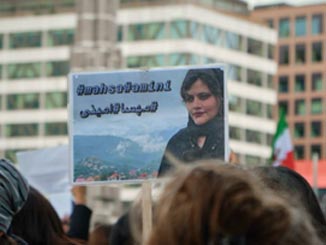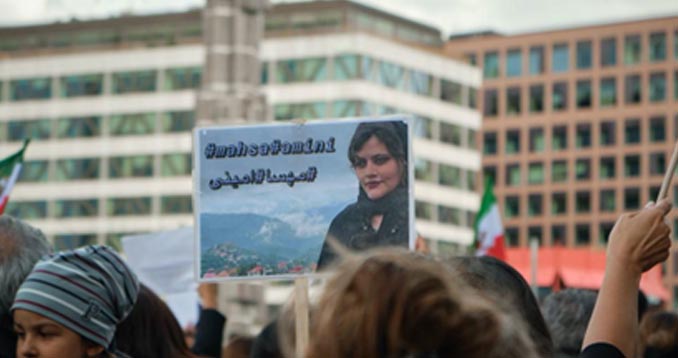

UN News Every 11 minutes, a woman or girl is killed by an intimate partner or family member, the UN chief said ahead of the International Day for the Elimination of Violence Against Women, commemorated on 25 November, urging everyone to “consign violence against women and girls to the history books”.
From the COVID-19 pandemic to economic turmoil, a range of stresses intensify physical and verbal abuse.
Following calls from UN human rights chief Volker Türk for an independent investigation into ongoing deadly violence against protesters in Iran, the Human Rights Council has created a fact-finding mission, related to the protests that began on 16 September 2022.
The Council, meeting in special session in response to the crisis that was sparked by the death in September in police custody of 22-year-old Jina Mahsa Amini, heard Mr. Türk criticize “the fortress mentality of those who wield power” in Iran. The “unnecessary and disproportionate use of force” must end, he insisted.
“It pains me to see what is happening in the country,” he told the packed chamber. “The images of children killed. Of women beaten in the streets. Of people sentenced to death.”
The UN High Commissioner highlighted how the security forces, “notably the Islamic Revolutionary Guard Corps and Basij forces have used live ammunition, birdshot and other metal pellets, teargas and batons” against the protest movement as it has spread to a reported 150 cities and 140 universities in all provinces of Iran.
Before calling for an independent probe into all alleged rights violations, the High Commissioner noted that his Office had received “multiple communications” from Iran about the episode, “including domestic investigations”.These efforts “have failed to meet international standards of impartiality,
Responding to the High Commissioner’s comments, Iran’s representative, Khadijeh Karimi, Deputy of the Vice President for Women and Family Affairs, insisted that “necessary measures” had been taken to seek justice by the Government, after Ms. Amini’s death. These included the formation of an independent, parliamentary investigation commission as well as a forensic medical team.
“However, before the formal announcement of the probe analysis, the biased and hasty reaction of a number of Western authorities and their interventions in internal affairs of Iran, turned the peaceful assemblies into riots and violence,” she maintained.
Also speaking at the Special Session – the Council’s 35th since it was founded in 2005 – Javaid Rehman, Special Rapporteur on the situation of human rights in Iran insisted that in the past week, efforts to silence the protesters had intensified, including against children. At least 60 to 70 people have been killed, he said, including five children, mostly from Kurdish areas. He also described as “alarming” the situation in the Kurdish cities of Piranshahr, Javanrood and Mahabad.
“The Iranian Government has consistently presented unsubstantiated reports and reiterated assertions claiming that Jina Mahsa did not die as a result of any violence or beatings,” he said. “In other reports, the Government refutes the killings of children by security forces, claiming that they committed suicide, fell from a height, were poisoned or killed by anonymous ‘enemy agents’.” These are three of an estimated 400 who have been killed because they stood up for their right to determine their own life.
Since Ms. Amini’s death following her arrest by Iran’s so-called Morality Police on 13 September for not wearing her hijab properly, more than 300 people have been killed in protests, including at least 40 children, according to latest UN human rights office information.
At least 15,000 people have been arrested too “and the Iranian regime is now threatening protesters with the death penalty,” said Foreign Minister Annalena Baerbock of Germany, which originally called for the Special Session: “And why? Only because these women, men and children want to enjoy the rights we all want to enjoy: to live in dignity and without discrimination.”
Echoing that message, United States Human Rights Ambassador in Geneva Michèle Taylor told the Council that the people of Iran were “demanding something so simple, something that most of us here take for granted: the opportunity to speak and to be heard. We applaud their courage, especially the women, girls and young people who are bravely demanding respect for their human rights and accountability for abuses.”
Meanwhile, misogynistic hate speech and sexual harassment trigger rampant online exploitation against women and girls. “This discrimination, violence and abuse targeting half of humanity comes at a steep cost”, Secretary-General António Guterres underscored in his message for the day.
“It limits women’s and girls’ participation in all walks of life, denies their basic rights and freedoms, and blocks the equal economic recovery and sustainable growth our world needs”.
A woman leads a focus group in Mali, where she sensitizes girls and women against all forms of violence, including child marriage and female genital mutilation, in order to bring behavior change. He upheld that it is time for “transformative action” that ends violence against women and girls – the most pervasive human rights violation in the world.
The top UN official outlined what needed to be done, including that governments design, fund and implement national action plans to tackle this scourge.
Moreover, grassroots and civil society groups must be involved at every stage of decision-making and all laws “implemented and respected”, so survivors can see their rights to justice and support upheld.
He also urged everyone to support public campaigns that challenge patriarchal norms and promote different forms of masculinities that reject misogyny and violence.
According to the UN chief, this year’s theme, “UNITE: Activism to End Violence Against Women and Girls”, reminds everyone to stand with activists around the world demanding change and support survivors of violence.
“I call on governments to increase funding by 50 per cent to women’s rights organizations and movements by 2026”, he stated.
In closing, the Secretary-General advocated for the world to “take a stand and raise our voices in support of women’s rights…[and] proudly declare: We are all feminists”.
“Supporting and investing in strong, autonomous women’s rights organizations and feminist movements is key to ending violence against women and girls”, says the UN.
A woman participates in a march against gender violence in Quito, Ecuador.
Five years ago, the #MeToo movement exploded, sparking global mobilization in preventing and responding to violence against women and girls.
Since then, unprecedented awareness and momentum have been created.
At the same time however, there has been a rise in anti-feminist groups – resulting in shrinking space for civil society, a backlash against women’s rights organizations and a rise in attacks against women human rights defenders and activists.
Impunity, silence, stigma and shame surrounding violence against women and girls (VAWG) has kept the persistent and devastating human rights violation largely unreported.
The Declaration on the Elimination of Violence Against Women defines violence against women as “any act of gender-based violence that results in, or is likely to result in, physical, sexual or psychological harm or suffering to women, including threats of such acts, coercion or arbitrary deprivation of liberty, whether occurring in public or in private life.”
The adverse psychological, sexual and reproductive health consequences of VAWG affect women at all stages of life and can happen to anyone, anywhere.
VAWG take many forms, such as
- Intimate partner violence, from battering to psychological abuse and marital rape to femicide.
- Sexual violence and harassment that can involve rape, forced sexual acts, unwanted sexual advances, stalking and cyber- harassment.
- Human trafficking, which encompasses slavery and sexual exploitation.
- Female genital mutilation.
- Child marriage.
Additionally, this violence continues hamper equality, development, peace and the fulfillment of women and girls’ human rights – preventing the promise of the Sustainable Development Goals (SDGs) to leave no one behind.
The International Day also kicks off the UNiTE campaign, an initiative of 16 days of activism that runs from 25 November to 10 December and concludes on International Human Rights Day.
This campaign aims to prevent and eliminate VAWG, calling for global action to increase awareness, promote advocacy and create opportunities to discuss challenges and solutions.
This year, UNITE will mobilize all society globally to stand in solidarity with women’s rights activists and to support feminist movements to resist any rollback on women’s rights.
Meanwhile, General Assembly President Csaba Kőrösi visited the Manhattan Family Justice Center, where local leaders and community-based organizations assisting survivors of domestic and gender-based violence told him that because every survivor is unique, judgement-free solutions must be too.
“These issues are complicated. There are families, children involved. People will reach out for help multiple times, they might want to understand their options, connect with family, because these are life-changing decisions,” said Commissioner Cecile Noel, from the Mayor’s Office to End Domestic Violence and Gender-Based Violence.
She noted that on average, it takes seven attempts to leave a domestic violence relationship.
“Put what you own in a plastic bag and leave. That’s basically what we’re asking them to do”.
UN General Assembly President Csaba Kőrösi and spouse Edit Móra meet with New York City Commissioners Cecile Noel and Edward Mermelstein, and community-based organizations supporting survivors of domestic and gender-based violence.
The Manhattan Family Justice Center, one of five in New York City, connects survivors and their children with organizations that provide case management, economic empowerment, counseling, civil legal, and criminal legal assistance.
To get a first-hand look at how services are provided and tease out how the Assembly could support those efforts, Mr. Kőrösi spoke with representatives of the Arab American Support Center, Safe Horizon, Sanctuary for Families, and the Urban Resource Institute.
“We are here to find out the good news from your work that can be brought to the UN and through the UN, to the entire world,” said Mr. Kőrösi, who was accompanied by his wife Edit Móra.
“There is no one size fits all solution”, reiterated Michael Polenberg, from Safe Horizon.
Lauren Schuster from the Urban Resource Institute highlighted the importance of including survivors in solutions, saying, “we cannot deicide for them what their journey looks like”.
The discussion also touched on trust building, domestic and gender-based violence education, and the emotional learning among children as well as helping youth think differently about their behaviors.
Earlier that day, two bills were signed – one focusing on low-barrier grant and supportive services to help survivors maintain housing.
NYC has 54 shelters for survivors of domestic or gender-based violence, which cater to some 4,000 families – separate from the city’s homeless population, which surpassed 60,200 in September. “Many of the survivors are employed. They cannot continue to do that living off a mother’s couch or out of hosing. And often with children in tow”, said Commissioner Noel.

Leave a Reply